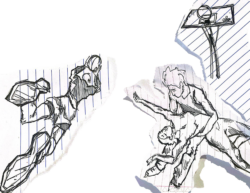The best of times, the worst of times—no matter the situation, there is a group of people who will have your back. With Oscar Pistorius, it is expected his family and close friends will remain by his side despite his alleged murder of South African supermodel and girlfriend Reeva Steenkamp.
But Pistorius, a groundbreaking Paralympic athlete, has a much bigger following than your everyday murderer. Pistorius was born without legs and still managed to run in the 2012 Olympic Games with prosthetic limbs. While he did not win, his story was an inspiration to millions. (bellarinova.com)
We have seen plenty of disappointment from our athletes so far in 2013. Manti Te’o turned an inspirational story of persevering through his girlfriend’s death into a farce and in the ultimate turn of events, Ray Lewis won the Super Bowl and screamed, “When God is on your side, all is forgiven!”
Lewis, who likely used performance-enhancing drugs to recover for the Ravens’ Super Bowl run, was once charged with the stabbing murder of two men. He was let off when prosecutors failed to locate the suit he wore that night. Since then, he has rebuilt his image, ironically, as a savage on the field.
During the buildup to the Super Bowl, we heard whimpers only from the families of the two victims. It was all drowned out by the football junkies, those who couldn’t see past Lewis’ status as the best middle linebacker in the history of the game.
Repairing one’s image is pretty easy in sports. It’s nice to be afforded the chance for redemption, but based purely on athletic ability, it is ridiculous.
A couple of days ago, Pistorius’s agent, Peet Van Zyl, came out and said, “I can tell you that we have had overwhelming support for Oscar from a lot of fans from a global scale.”
Are you kidding me? Based on what? It is likely that Van Zyl is exaggerating and even posturing to improve the character portrayal of his client. But the middling “global support” Pistorius receives is reflective of the brittle pedestal on which we anoint our athletes.
The problem with that fragility isn’t that it is easy to tear down an athlete. That can happen and sometimes for the wrong reasons. Rather, the issue occurs because that pedestal is so easy to build back up.
Take a look at Kobe Bryant and Ben Roethlisberger—both charged with varying degrees of sexual assault in the primes of their career. Both lost endorsements (Kobe lost Nutella, particularly devastating) and both lost a ton of respect.
For both athletes, though, it marked a temporary setback, particularly for the Mamba. Bryant regained the majority of his endorsements and added some he didn’t have before.
I’ve asked a number of college athletes—George Mason’s Sherrod Wright, Providence’s Bryce Cotton, and Kansas’ Ben McLemore among them—whom they admire most in the NBA. They will usually flirt around with a couple of names, but Bryant is always the consensus.
It’s for the tireless work he puts in, his competitive drive, and the consequent success it brings. People love to hate on Bryant, but not because of that 2003 sexual assault case. The gains he made since that time haven’t been solely pecuniary, as the incident has been forgotten. Instead, it’s admonishing the success and reveling in every failure Bryant faces that fuels his haters.
The turnaround is different for Bryant, though, as well as for Lewis. Te’o presents a bit of middle ground—he had a sob story, one that we assumed motivated him. It inspired people and was thus even more devastating when the truth was revealed. But his naiveté—dumb jock, immature college kid—played a large role in forgiveness. In actuality, he was made a mockery of more than scorned.
With Pistorius, it’s a little different. Athletes with disabilities are well aware of their limitations. He defied that. He was a true hero for simply defying insurmountable odds. He did not win, but qualifying for and competing in London was enough for those admirers.
To me, that’s the highest pedestal an athlete can reach. Pistorius inspired for far more than his athletic prowess. But with that lofty status, the fall becomes even more devastating.
Pistorius was not the first Paralympic athlete to compete in the Olympics—he’s actually the 10th. There were some before him and surely will be plenty after him, especially as technology improves. Holding our athletes on a pedestal is one thing. Clinging to a murderer freefalling from one is another matter entirely.




